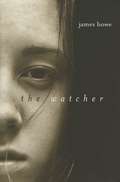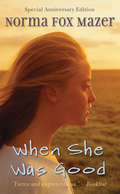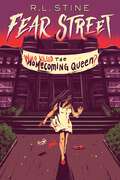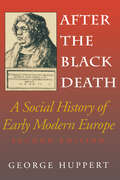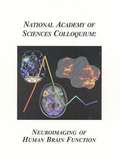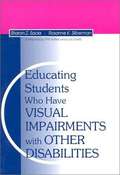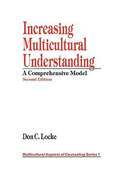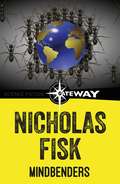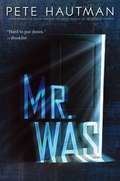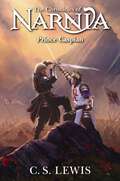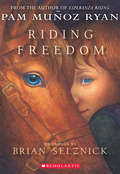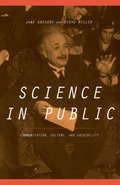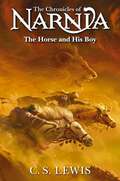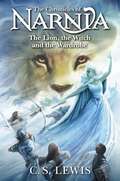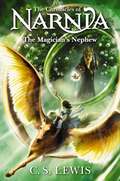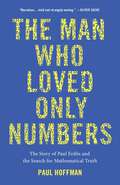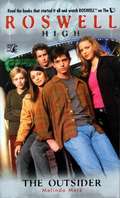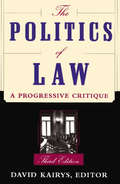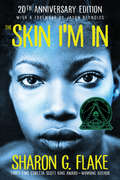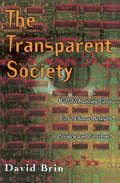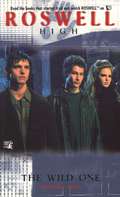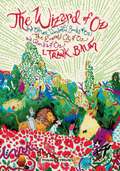- Table View
- List View
The Watcher
by James HoweA mysterious girl, dubbed The Watcher, spins tales of rescue from her lonely perch above the beach. She closely observes the actions of two people she has never met: a fourteen-year-old boy whose family seems perfect and a handsome eighteen-year-old lifeguard. Their lives become intertwined -- and their troubling truths are revealed.
When She Was Good
by Norma Fox MazerNorma Fox Mazer's remarkable story of two sisters fighting to survive against a world without caring.In the sad, shabby trailer where Em Thurkill lived her first fourteen years, suffering her father's alcoholic rages and her mother's deathly silence, and in the three she lived trapped with her violent, unstable sister, there seems more than enough to end even the dream of hope.Yet Em Thurkill's story is a story of how hope outlives brutality. It is a story of one girl's sweetness, and almost unbearable pain. Heartbreaking, mesmerizing, and ultimately transcendent, this novel is a tribute to the astonishing resilience of the human soul.
Who Killed the Homecoming Queen? (Fear Street #48)
by R.L. StineTania is having the best year of her life. She has a hot new boyfriend, she landed the starring role in a student film, and she’s just been voted homecoming queen. But someone is jealous of Tania. Someone plans to ruin her perfect year—even if that means killing her. Will Tania live to see the homecoming dance?
After the Black Death, Second Edition: A Social History of Early Modern Europe
by George HuppertPraise for the first edition:"To give a sense of immediacy and vividness to the long period in such a short space is a major achievement." —History"Huppert's book is a little masterpiece every teacher should welcome." —Renaissance QuarterlyA work of genuine social history, After the Black Death leads the reader into the real villages and cities of European society. For this second edition, George Huppert has added a new chapter on the incessant warfare of the age and thoroughly updated the bibliographical essay.
Colloquium On Neuroimaging Of Human Brain Function
by Frank Rosler Charan Ranganath Brigitte Roder Rainer KluweThe National Academies Press (NAP)--publisher for the National Academies--publishes more than 200 books a year offering the most authoritative views, definitive information, and groundbreaking recommendations on a wide range of topics in science, engineering, and health. Our books are unique in that they are authored by the nation's leading experts in every scientific field.
Educating Students Who Have Visual Impairments With Other Disabilities
by Sharon Sacks Rosanne K. SilbermanWith a concentration on education needs, learning styles, and recommended classroom practices, this introductory text demonstrates functional assessment and teaching adaptations that improve inclusive learning experiences for students with a wide range of visual impairments and multiple disabilities.
Human Anatomy and Physiology (4th edition)
by Elaine N. MariebIn this text Marieb (Holyoke Community College) integrates the relationships of body organ systems, homeostasis, and complementarity of structure and function.
Increasing Multicultural Understanding: A Comprehensive Model
by Don C. LockeLocke's book has become the flagship of the Multicultural Aspects of Counseling series--both as the most popular book in the series and as the first book published in it, reflecting accurately the many goals and dreams we had when the series was conceptualized. In this second edition, Locke has added chapters on the Jewish and the Muslim cultural contexts, with guidelines for counselors working with clients in those cultures. The other 10 chapters have been significantly updated since the 1992 first edition to include some of the extensive publi¬cations that have been written since that time.
Legal Office: Concepts and Procedures
by Robert CumminsThis textbook-workbook is divided into three parts with seventeen chapters to provide the legal office assistant student with a logical frame of reference in the study of the basic concepts of the law.
Mindbenders
by Nicholas FiskVinny and Toby can make things happen just by using their minds. As Vinny stares at a box of ants, she feels as though she is plugging into a giant power socket. It is then that she hears a voice, letting her know that the ants plan to take over the Earth. Can Vinny stop it before it's too late?
Mr. Was
by Pete HautmanJack Lund figures a good day is when his dad's too drunk to beat up his mom. For Jack, Bogg's End is the end. The end of the turbulent, see-saw years of watching his father go on the wagon and fall right back off gain. Once it took two years, but the inevitable inevitably happened. Now it's just Jack and his mom starting over in the strange old house his grandfather left them. But the ride's not over yet. Jack's father returns, full of apologies and promises, and for a little while, things are looking up. Then in one terrifying, sickening moment, everything comes crashing back down again. So Jack runs. He runs through a strange hidden door that takes him back in time to before his parents were born. Before he was born. Maybe with a second chance he can stop the inevitable. At least he's got to try. What Jack doesn't understand, though, is that he can't change his future until he faces his past.
Origins of Nationality in South Asia: Patriotism and Ethical Government in the Making of Modern India
by C. A. BaylyThis book considers the ideological and institutional antecedents of mature Indian nationalism. It argues that patriotism is a useful concept with which to understand India in the eighteenth and early nineteenth centuries. It includes essays on swadeshi, Indian resistance, and "communalism."
Prince Caspian: The Return to Narnia (Chronicles of Narnia #4)
by C. S. LewisIllustrations in this ebook appear in vibrant full color on a full-color ebook device and in rich black and white on all other devices.Narnia . . . where animals talk . . . where trees walk . . . where a battle is about to begin.A prince denied his rightful throne gathers an army in a desperate attempt to rid his land of a false king. But in the end, it is a battle of honor between two men alone that will decide the fate of an entire world.Prince Caspian is the fourth book in C. S. Lewis’s The Chronicles of Narnia, a series that has become part of the canon of classic literature, drawing readers of all ages into a magical land with unforgettable characters for over sixty years. This is a stand-alone novel, but if you would like to see more of Lucy and Edmund’s adventures, read The Voyage of the Dawn Treader, the fifth book in The Chronicles of Narnia.
Riding Freedom
by Pam Muñoz RyanA reissue of Pam Munoz Ryan's bestselling backlist with a distinctive new author treatment.In this fast-paced, courageous, and inspiring story, readers adventure with Charlotte Parkhurst as she first finds work as a stable hand, becomes a famous stage-coach driver (performing brave feats and outwitting bandits), finds love as a woman but later resumes her identity as a man after the loss of a baby and the tragic death of her husband, and ultimately settles out west on the farm she'd dreamed of having since childhood. It wasn't until after her death that anyone discovered she was a woman.
Science In Public: Communication, Culture, And Credibility
by Jane Gregory Steven MillerDoes the general public need to understand science? And if so, is it scientists' responsibility to communicate? Critics have argued that, despite the huge strides made in technology, we live in a "scientifically illiterate" society--one that thinks about the world and makes important decisions without taking scientific knowledge into account. But is the solution to this "illiteracy" to deluge the layman with scientific information? Or does science news need to be focused around specific issues and organized into stories that are meaningful and relevant to people's lives? In this unprecedented, comprehensive look at a new field, Jane Gregory and Steve Miller point the way to a more effective public understanding of science in the years ahead.
The Horse and His Boy: The Chronicles of Narnia (Chronicles of Narnia #3)
by C. S. LewisIllustrations in this ebook appear in vibrant full color on a full-color ebook device and in rich black and white on all other devices.Narnia . . . where horses talk . . . where treachery is brewing . . . where destiny awaits.On a desperate journey, two runaways meet and join forces. Though they are only looking to escape their harsh and narrow lives, they soon find themselves at the center of a terrible battle. It is a battle that will decide their fate and the fate of Narnia itself.The Horse and His Boy is the third book in C. S. Lewis's The Chronicles of Narnia, a series that has become part of the canon of classic literature, drawing readers of all ages into a magical land with unforgettable characters for over sixty years. This is a novel that stands on its own, but if you would like to return to Narnia, read Prince Caspian, the fourth book in The Chronicles of Narnia.
The Lion, the Witch and the Wardrobe (Chronicles of Narnia #2)
by C. S. LewisThe Lion, the Witch and the Wardrobe is the second book in C. S. Lewis's The Chronicles of Narnia, a series that has become part of the canon of classic literature, drawing readers of all ages into a magical land with unforgettable characters for over fifty years. Four adventurers step through a wardrobe door and into the land of Narnia, a land enslaved by the power of the White Witch. But when almost all hope is lost, the return of the Great Lion, Aslan, signals a great change . . . and a great sacrifice. This ebook contains the complete text and art. Illustrations in this ebook appear in vibrant full color on a full-color ebook device and in rich black-and-white on all other devices. This is a stand-alone read, but if you would like to explore more of the Narnian realm, pick up The Horse and His Boy, the third book in The Chronicles of Narnia.
The Magician's Nephew (Chronicles of Narnia #1)
by C. S. LewisDon’t miss one of America’s top 100 most-loved novels, selected by PBS’s The Great American Read. Narnia . . . a land frozen in eternal winter . . . a country waiting to be set freeWitness the creation of a magical land in The Magician's Nephew, the first title in C. S. Lewis's classic fantasy series, which has captivated readers of all ages for over sixty years On a daring quest to save a life, two friends are hurled into another world, where an evil sorceress seeks to enslave them. But then the lion Aslan's song weaves itself into the fabric of a new land, a land that will be known as Narnia. And in Narnia, all things are possible.This ebook contains the complete text and art. Illustrations in this ebook appear in vibrant full color on a full-color ebook device and in rich black-and-white on all other devices.This is a stand-alone novel, but if you want to journey back to Narnia, read The Lion, the Witch and the Wardrobe, the second book in The Chronicles of Narnia.
The Man Who Loved Only Numbers: The Story of Paul Erdos and the Search for Mathematical Truth
by Paul Hoffman"A funny, marvelously readable portrait of one of the most brilliant and eccentric men in history." --The Seattle Times Paul Erdos was an amazing and prolific mathematician whose life as a world-wandering numerical nomad was legendary. He published almost 1500 scholarly papers before his death in 1996, and he probably thought more about math problems than anyone in history. Like a traveling salesman offering his thoughts as wares, Erdos would show up on the doorstep of one mathematician or another and announce, "My brain is open." After working through a problem, he'd move on to the next place, the next solution. Hoffman's book, like Sylvia Nasar's biography of John Nash, A Beautiful Mind, reveals a genius's life that transcended the merely quirky. But Erdos's brand of madness was joyful, unlike Nash's despairing schizophrenia. Erdos never tried to dilute his obsessive passion for numbers with ordinary emotional interactions, thus avoiding hurting the people around him, as Nash did. Oliver Sacks writes of Erdos: "A mathematical genius of the first order, Paul Erdos was totally obsessed with his subject--he thought and wrote mathematics for nineteen hours a day until the day he died. He traveled constantly, living out of a plastic bag, and had no interest in food, sex, companionship, art--all that is usually indispensable to a human life."The Man Who Loved Only Numbers is easy to love, despite his strangeness. It's hard not to have affection for someone who referred to children as "epsilons," from the Greek letter used to represent small quantities in mathematics; a man whose epitaph for himself read, "Finally I am becoming stupider no more"; and whose only really necessary tool to do his work was a quiet and open mind. Hoffman, who followed and spoke with Erdos over the last 10 years of his life, introduces us to an undeniably odd, yet pure and joyful, man who loved numbers more than he loved God--whom he referred to as SF, for Supreme Fascist. He was often misunderstood, and he certainly annoyed people sometimes, but Paul Erdos is no doubt missed. --Therese Littleton
The Outsider: The Outsider (Roswell High #1)
by Melinda MetzThe acclaimed Roswell High series—and the inspiration for the Roswell, New Mexico TV series—returns with this new introduction, perfect for fans of Stranger Things and Riverdale. He&’s not like other guys. Liz has seen him around school. It&’s hard to miss Max—the tall, blond, blue-eyed senior stands out among all the other students at Roswell High. So why is he such a loner? Max is in love with Liz. He loves the way her eyes light up when she laughs and the way her long, black hair moves when she turns her head. Most of all, he loves to imagine what it would be like to kiss her. But he knows he can&’t get too close. He can&’t risk her discovering the truth about who he is—or what he is.... Because the truth could kill her.
The Politics Of Law: A Progressive Critique, Third Edition
by David KairysThe Politics of Law is the most widely read critique of the nature and role of the law in American society. This revised edition continues the book’s concrete focus on the major subjects and fields of law. New essays on emerging fields and the latest trends and cases have been added to updated versions of the now-classic essays from earlier editions. A unique assortment of leading scholars and practitioners in law and related disciplines-political science, economics, sociology, criminology, history, and literature-raise basic questions about law, challenging long-held ideals like the separation of law from politics, economics, religion, and culture. They address such issues contextually and with a keen historical perspective as they explain and critique the law in a broad range of areas. This third edition contains essays on all of the subjects covered in the first year of law school while continuing the book’s tradition of accessibility to non-law-trained readers. Insightful and powerful, The Politics of Law makes sense of the debates about judicial restraint and the range of legal controversies so central to American public life and culture.
The Skin I'm in
by Sharon FlakeMaleeka suffers every day from the taunts of the other kids in her class. If they're not getting at her about her homemade clothes or her good grades, it's about her dark, black skin.When a new teacher, whose face is blotched with a startling white patch, starts at their school, Maleeka can see there is bound to be trouble for her too. But the new teacher's attitude surprises Maleeka. Miss Saunders loves the skin she's in. Can Maleeka learn to do the same?
The Transparent Society: Will Technology Force Us To Choose Between Privacy And Freedom?
by David BrinIn New York and Baltimore, police cameras scan public areas twenty-four hours a day. Huge commercial databases track you finances and sell that information to anyone willing to pay. Host sites on the World Wide Web record every page you view, and "smart" toll roads know where you drive. Every day, new technology nibbles at our privacy.Does that make you nervous? David Brin is worried, but not just about privacy. He fears that society will overreact to these technologies by restricting the flow of information, frantically enforcing a reign of secrecy. Such measures, he warns, won't really preserve our privacy. Governments, the wealthy, criminals, and the techno-elite will still find ways to watch us. But we'll have fewer ways to watch them. We'll lose the key to a free society: accountability.The Transparent Society is a call for "reciprocal transparency." If police cameras watch us, shouldn't we be able to watch police stations? If credit bureaus sell our data, shouldn't we know who buys it? Rather than cling to an illusion of anonymity-a historical anomaly, given our origins in close-knit villages-we should focus on guarding the most important forms of privacy and preserving mutual accountability. The biggest threat to our freedom, Brin warns, is that surveillance technology will be used by too few people, now by too many.A society of glass houses may seem too fragile. Fearing technology-aided crime, governments seek to restrict online anonymity; fearing technology-aided tyranny, citizens call for encrypting all data. Brins shows how, contrary to both approaches, windows offer us much better protection than walls; after all, the strongest deterrent against snooping has always been the fear of being spotted. Furthermore, Brin argues, Western culture now encourages eccentricity-we're programmed to rebel! That gives our society a natural protection against error and wrong-doing, like a body's immune system. But "social T-cells" need openness to spot trouble and get the word out. The Transparent Society is full of such provocative and far-reaching analysis.The inescapable rush of technology is forcing us to make new choices about how we want to live. This daring book reminds us that an open society is more robust and flexible than one where secrecy reigns. In an era of gnat-sized cameras, universal databases, and clothes-penetrating radar, it will be more vital than ever for us to be able to watch the watchers. With reciprocal transparency we can detect dangers early and expose wrong-doers. We can gauge the credibility of pundits and politicians. We can share technological advances and news. But all of these benefits depend on the free, two-way flow of information.
The Wild One: The Wild One (Roswell High #2)
by Melinda MetzDangerous love... Isabel: From the moment she hears the roar of Nikolas' motorcycle, she's hooked. This new guy in town seems to understand exactly how she feels and thinks, exactly what she needs. He's someone willing to let her be what she was born to be...the wild one. Alex: He's jealous of Isabel's new boyfriend. Worse, he fears that Nikolas is dragging Isabel deeper and deeper into danger. If Isabel's not careful, Sheriff Valenti will discover the truth about her. And if that happens, no one from Earth will be able to save her....
The Wizard of Oz: And Other Wonderful Books of Oz: The Emerald City of Oz and Glinda of Oz (Penguin Classics Deluxe Edition) (Penguin Classics Deluxe Edition #1, 6, 14)
by L. Frank BaumSantore's version of the L. Frank Baum fantasy is highly visual yet faithful to the original story. never before have the Land of the Munchkins been more enchanting, the forest of Oz more foreboding, or the Emerald City more magnificent. Santore's journey through Oz is a journey of color and beauty as well as one of excitment and adventure.
